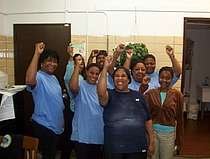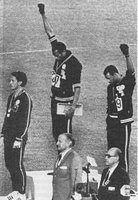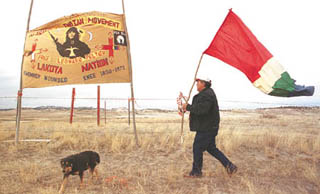
Racism at the Memorial
The names of Local 171 members are blocked out on some of the documents to protect their right to confidentiality.
Black worker fired for
drinking soda; white worker brings opium to work and keeps his job.
In 2001, a Local 171 worker who had been fired got his job back as the result of a grievance. We’ll call this worker “Bob” to protect his privacy. Bob went to work in the dish room at the Memorial Union. Within days of Bob, a black man, starting in the dish room, Larry, a white man working as a Limited Term Employee, was telling people that Bob had fired from his last job, and that Kitchen Manager Tim Vertein had told Larry that Bob would soon be fired, and that Vertein would hire Larry for Bob’s job.
As a union represented worker, Bob was paidaround $22,000 dollars a year. Larry would have made around $14,000 a year if he worked full time, which he did not.. Bob received health insurance, paid vacation and sick leave, and he had a retirement plan. As an L TE who had worked at the Memorial Union on and off for years, Larry got not of these benefits. Larry would have received a raise in pay and benefits worth more than $12,000 a year if had been hired for Bob’s job.
TE who had worked at the Memorial Union on and off for years, Larry got not of these benefits. Larry would have received a raise in pay and benefits worth more than $12,000 a year if had been hired for Bob’s job.
Larry immediately stared harassing Bob, as did “Pete”, a member of Local 171 and the only union represented worker in the dish room other than Bob. Bob and Local 171 Steward Mark Thomas began documenting incidents of harassment, and after Larry exposed himself to Bob and told Bob to kiss his ass, Thomas filed a complaint against Larry, Kitchen Manager Tim Vertein, and Memorial Union Human Resource rep Nancy Graff-Shultz. Thomas named Graff-Schultz in the complaint because she told Thomas that since he wanted to use a computer to write his complaint, he had to do it on his own time.
Graff-Schultz found out about Thomas’s complaint on
All civil service employees – union represented and supervisors – were interviewed and forced to sign statements. Half a dozen workers claimed that Thomas and Aniel had urged kitchen workers to slow down and commit other sabotage, and Thomas and Aniel were suspended for one day in December 2002 and January 2003.
In an email from Kathy Stella of the Central Campus Human Resources Office to Graff-Schultz on
Graff-Schultz wrote a summary of the investigators’ interview. In it, she ignores statements about Vertein making comments about bringing a gun to work and killing people, and that one worker reported Vertein walking behind him and making the sound of a gunshot. She also fails to note that some of the people said they knew about the investigation in advance.
The Equity and Diversity Office didn’t issue a decision on Thomas’s charges until May 2003, when they found Thomas’s charges without merit. However, in an email sent from the Memorial Union Human Resources to the Central Camus Human Resource on
Bob was fired in Sept. 2003 for allegedly drinking a soda that he hadn’t paid for. While technically a violation of university policy, nobody except Bob has been disciplined for eating or drinking food they hadn’t paid for at the Memorial Union for over fifteen years. Larry, on the other hand, once brought what UW Police refer to as “suspected opium” to work, followed a woman into a secluded part of the kitchen, and then thrust the dope on her. Her mental health counselor called UW Police, and despite the fact that Larry admitted everything, he was not fired or suspended.
 Local 171 members are used to managers with double standards, but even they were surprised that a boss would ignore someone bringing dope to work after the cops found out. Larry was fired after Bob was fired, Larry having become a liability. Thomas and Aniel lost the arbitration over their suspension, proving that the university did a semi-competent job of framing them. The threat of a reaction form the progressive community on campus and in Madison, along with administrators so stupid they sent emails about a frame up, saved Thomas’s and Aniel’s job. However, Vertein and his backers weren’t done harassing black workers or union stewards.
Local 171 members are used to managers with double standards, but even they were surprised that a boss would ignore someone bringing dope to work after the cops found out. Larry was fired after Bob was fired, Larry having become a liability. Thomas and Aniel lost the arbitration over their suspension, proving that the university did a semi-competent job of framing them. The threat of a reaction form the progressive community on campus and in Madison, along with administrators so stupid they sent emails about a frame up, saved Thomas’s and Aniel’s job. However, Vertein and his backers weren’t done harassing black workers or union stewards.
Vertein harasses another black man by exposing his criminal record.
Shortly after John started as a represented worker, Vertein told his lead worker that John had a criminal record. The lead worker told Local 171 Union Steward Carl Aniel about Vertein’s action. Aniel and fellow Steward Mark Thomas met with Mary Hoddy on
John was on probation as a represented worker – that is, he could be fired within six months with no recourse to the grievance procedure. Local 171 Stewards decided not to tell John about Vertein’s action until this probation had passed, fearing that John would confront Vertein and Vertein would fire him.
Unfortunately, Thomas got the dates wrong and approached John
Instead John confronted Vertein the next day. Vertein assured John that Thomas was lying. Vertein wrote out a statement saying that he had told no one except John’s supervisors about John’s record, and both John and Vertein signed the statement. Vertein then did an “investigation” of everyone involved, except that another kitchen supervisor, Jay Shcoenbeck, interviewed Thomas. While the interview notes for most of the people interviewed are quite clear, notes from the interview with the lead worker and Thomas, are so badly written that you can’t read Thomas’s statement. During the interviews, the lead worker confirmed that Vertein had told him about Bob’s record.
Vertein made another signed statement admitting that he had told “the lead worker” that John had “a past”. This document is dated2-06-04, but was probably made at a later date when Vertein found out that the lead worker wasn’t going to lie for him. Thomas got a letter of reprimand for telling John that Vertein had told kitchen workers about John’s record. University administrators backed up Vertein when they denied Thomas’s grievance over the reprimand.
The Wisconsin Union attendance policy provided that a worker who was sick or tardy four times in a three month period would be subject to formal discipline – reprimands, suspensions, and termination. The policy set out specific discipline on an increasingly harsh level. Some acts, such as not calling in and then not showing up – a so called no call, no show – are to result in harsher discipline than just calling in too often.
Vertein issued reprimands to John and “Fred”, a white man represented by Local 171, in July 2004. Both of them had been absent enough to justify a reprimand; however Fred should have received a suspension under the attendance policy, as he had been reprimanded - not suspended - within the previous year for a no call-no show.
In March of 2005, Vertein suspended John for being late twice and absent twice in four months – not enough to get busted under the Wisconsin Union’s attendance policy. Fred, on the other hand, did a second no call-no show. Vertein issued a one day suspension to Fred, but then replaced it with another letter of reprimand.
Under the attendance policy, Fred should have received a one day suspension for his first no call-no show, a three day suspension for calling in too often, and then been fired for the second no call-no show. Instead, he got three letters of reprimand.
 That’s more than Pete got– the same Pete who harassed Bob, as described in the second article above – who was late hundreds of times without any discipline. He was late so many times that Vertein and Vincent issued two “amnesties” in November 2004 and September 2005 where no one would be disciplined for attendance because they had let Pete be tardy so many times without taking action.
That’s more than Pete got– the same Pete who harassed Bob, as described in the second article above – who was late hundreds of times without any discipline. He was late so many times that Vertein and Vincent issued two “amnesties” in November 2004 and September 2005 where no one would be disciplined for attendance because they had let Pete be tardy so many times without taking action.
Local 171 Steward Busted Again
The Wisconsin Union administration then issued a work rule prohibiting represented workers from passing out leaflets at these events. From now on, all propaganda will come from the administration.
On
This was a mistake. It was actually the Memorial Union Human Resources Office, and they quoted Equity and Diversity as saying the charges “are not all erroneous”. Because of this small mistake, Vincent issued Thomas another reprimand, charging him with making a “false and malicious statement” and threatening “discipline, up to and including termination” if he does it again.
Still no answer to why Vincent tolerates Vertein's racism.
Collaborators Rewarded
It’s worth noting that both Pete and Fred, the two white men who had their blatant violations of the attendance policy downplayed or ignored, were two of the workers who gave false testimony against Local 171 Stewards Aniel and Thomas during the September 2002 "investigation".
Maybe You can Stop Racism at the Memorial Union, or, No Black Worker, No Problem
The Wisconsin Union administration, including Director Mark Guthier, is aware of the racist events in the Memorial Union kitchen. Guthier has sent a letter filled with platitudes to Local 171, but he has done nothing to address the Vertein’s bigotry towards black people. Like a lot of middle class white people, Guthier would never be rude to a black person because of their race, but is incapable of examining the role of his administration in tolerating racism on campus.


